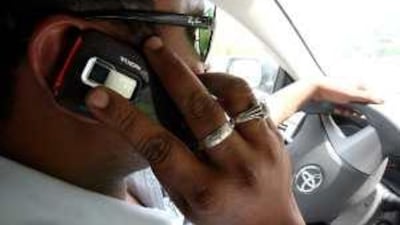Compared with drivers who pay full attention to the road, motorists using a hand-held mobile phone take longer to brake when confronted by a sudden hazard - making them four times more likely to be involved in an accident, according to a road safety campaigner.
"The result of driving and speaking is delayed reactions. That delay in seconds can make a small accident fatal," said Nisrine Sfeir, manager of the Salama Road Safety Public Awareness Initiative. The average driver going at 110kph would travel 31m by the time he or she was able to a react to a hazard that appeared on the road, according to research by Salama. But the delay in reaction caused by using a hands-free mobile phone increased this distance to 39m, while using a hand-held device extended it to 45m.
"The delay in foreseeing an obstacle can make you stop your car at a longer distance. Imagine if that obstacle was a child," Ms Sfeir said. "Texting while driving is even worse: not only are you lacking 100 per cent concentration, you are not looking where you are going." The dangers of not paying complete attention to the road needed to be hammered home to drivers, she said. "It is very important to concentrate because you are manipulating a machine."
Ms Sfeir said that in no similar circumstances, such as operating heavy machinery in construction or manufacturing, would people consider dividing their concentration. A ministerial order prohibiting the use of mobile phones while driving was introduced in the UAE in 1997, and a federal law passed in March last year increased the penalty for offenders to a fine of Dh200 (US$54) and four black points.
Despite this, and the dangers involved, The National saw widespread flouting of the law during a three-hour watch on the capital's roads, with around one in 15 drivers using a mobile phone at the wheel. At a busy junction on Airport Road, several drivers turning right and a taxi driver carrying passengers were spotted with hand-held phones clasped to their ears. On the Corniche, a lorry driver chatted on his phone while doing 49kph in the slow lane as three cars behind him waited to pass.
On Muroor Road, the driver of a Hummer sped past at 100kph while chatting on the phone. He seemed to be an exception, however, as most people using their phones were so engrossed in their conversations that they drove more slowly than the mainstream traffic. The police, particularly in Dubai, have begun targeting drivers using mobile phones. According to the most recent statistics available, Dubai Police issued 2,005 fines for the offence in January and February alone, compared with a total of 2,552 last year. In Abu Dhabi, police handed out 2,158 fines between January 1 and March 12 this year.
Besides penalising drivers, a campaign against phone use while driving entitled "Don't call until you arrive" was launched during the GCC-wide Traffic Week in March. Nevertheless, several motorists The National spoke to in Dubai not only said the problem persisted but admitted to being offenders themselves. "I never see people pulled over during peak hours. It's commonplace to see people talking on their phones while driving at 80kph in the fast lane of the Sheikh Zayed Road," said Ian Daley, a marketing manager who has lived in Dubai for three years.
Mr Daley, who drives a Hummer, admitted to using his phone while on the road, but said he preferred not to use the hands-free set. "Using hands-free is just a distraction for drivers because you'll take longer. On a handset, you'll shorten the call. It's a case of either being distracted for 30 seconds or for five minutes." Another expatriate motorist, Lee Franken, said he used a hands-free set while driving but sometimes took calls on his handset, while Caroline Lane said her friends used the phone all the time while driving.
Meanwhile the Salama initiative, which was launched jointly by the Emirates Foundation, private companies, government departments and non-governmental organisations, has been trying to get its road safety message across to younger drivers through presentations to university students. "We are trying to give them tangible reasons as to why driving safe makes sense," said Ms Sfeir. "For instance, we showed a crash test and the effect of it. If a child is not strapped into a child seat, it can become a 'bomb' in the event of a car crash.
"We showed students because, like any young person, their behaviour tends to be rash. We combine the approach of emotion and rationale. We need to talk to their rational side, to highlight the science and to make them think." Awareness and education remained the key to better road safety, she added. "We are all very confident while driving; the concept of driving is not something that we are scared of," she explained. And because people may have been driving while using a mobile phone for some time, "they don't link an accident with talking on a mobile phone."
glittle@thenational.ae eharnan@thenational.ae

